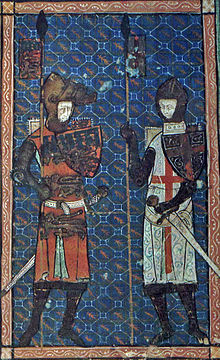Edmund Crouchback, 1st Earl of Lancaster
| Edmund Crouchback | |
|---|---|

Miniature of Edmund with Saint George from an early 14th-century manuscript (Oxford, Bodleian Library, MS Douce 231)
|
|
| Earl of Lancaster and Leicester | |
| Successor | Thomas |
| Born |
16 January 1245 London, England |
| Died | 5 June 1296 (aged 51) Bayonne, Duchy of Aquitaine |
| Burial | 15 July 1296 Westminster Abbey |
| Spouse |
Aveline de Forz (m. 1269; d. 1273) Blanche of Artois (m. 1276) |
| Issue |
Thomas, 2nd Earl of Lancaster Henry, 3rd Earl of Lancaster John, Lord of Beaufort Mary |
| House | Plantagenet |
| Father | Henry III of England |
| Mother | Eleanor of Provence |
Edmund Crouchback (16 January 1245 – 5 June 1296), a member of the House of Plantagenet, was the second surviving son of Henry III of England and Eleanor of Provence. In his childhood he had a claim on the Kingdom of Sicily, but he never ruled there. In 1265 he was granted all the lands of Simon de Montfort and from 1267 he was titled Earl of Leicester. In that year he also began to rule Lancashire, but he did not take the title Earl of Lancaster until 1276. Between 1276 and 1284 he governed the counties of Champagne and Brie with his second wife, Blanche of Artois, in the name of her daughter Joan. His nickname, "Crouchback" (meaning "crossed-back"), refers to his participation in the Ninth Crusade.
Edmund was born in London. He was a younger brother of Edward I, Margaret, and Beatrice, and an older brother of Catherine.
In 1255 he was invested ruler of the Kingdom of Sicily by the Bishop of Romania, on behalf of Pope Innocent IV. In return his father undertook to pay the papacy 135,541 marks and fight a war to dislodge the Hohenstaufen king Manfred. Upon Innocent's death, Pope Alexander IV confirmed Edmund's grant of Sicily. Henry's barons refused to contribute to what they called the "Sicilian business" and ultimately Henry was only able to pay 60,000 marks. Steven Runciman says the grant of the kingdom was revoked by Pope Alexander IV on 18 December 1258; Baines and Harland state that this occurred in 1263 under Pope Urban IV.
...
Wikipedia
